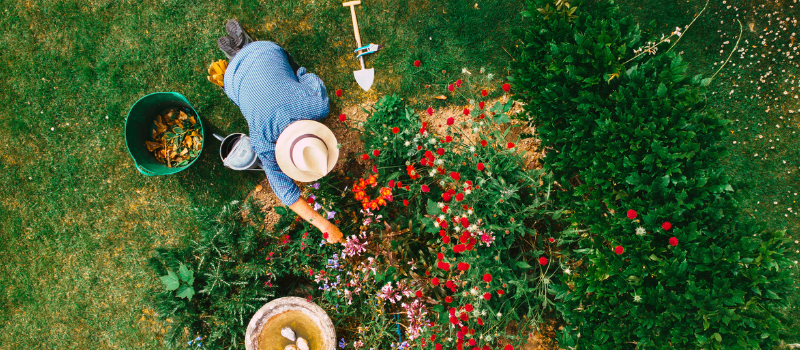
Cultivating change from the garden
Published August 29, 2023
Natasha Morgan is an award-winning landscape architect. With her hands deep in the soil and a heart connected to the rhythms of nature, Natasha has transformed her passion for gardening into a powerful tool for environmental protection and sustainability. Her journey began by recognising the potential for even the smallest of green spaces to make a significant impact.
“From the time I was a little girl learning how to garden by pottering in the inner city garden of a family friend, to making a tree-change with a purpose in 2014 from my busy city life, I have yearned to be more connected to nature, to live with the seasons, to put my hands in a little patch of soil and grow what I can,”
said Natasha.
“As my connection to nature has grown so too has nurturing nature become more and more important to me. It’s here in nature, on my little patch, growing, tending, making a garden out on my verge, creating spaces and experiences, or foraging, that I feel most at peace. Nature is a way to ease my mind, to slow down from the busyness of daily life, to nourish my soul and family, and to feel connected to something greater and be inspired. As I become more aware of what nature gives to me, the more I want to give back.”
– Natasha Morgan on why nurturing nature is important to her.
For Natasha, nurturing nature is about the little things.
It’s not about grand gestures, but rather the incidental everyday changes that she does to live more consciously, sustainably, and connected.
“Whether it be popping kitchen scraps in the compost, worm farm or sharing with my chooks to growing a few herbs in a pot to cut from as needed rather than buying them from a store or popping some veg in a little sunny corner of ground knowing there will be a few extra for sharing with family or friends, it’s in these little everyday ways that I choose to give back.
Even just visiting my local farmer’s market and learning when a few of my favourite fruit or veg is in season means I can enjoy them at their prime, reduce food miles, energy, and resources, and build a relationship with the farmer who grows my food. And who doesn’t love a peach or a handful or cherries from the local farmer’s market that you know were left in the sun to ripen on the tree?!”
One transformative habit that made a big impact on Natasha’s life was growing something edible, no matter the amount of garden space she had available.
“Wherever I have lived, be it in an inner-city apartment, suburban block or a little 500 square meter patch in regional Victoria, I have tried to grow something edible and productive. A few everyday herbs (parsley, thyme, rosemary for example), some garlic, or even just a little one-meter patch in the sunshine to grow a few veg has meant I’ve not only been able to get outdoors, soak up some sunshine, or have a moment of quiet time, but I’ve also been able to become that little bit more eco-minded and sustainable.”
For those hoping to nurture nature by having a green thumb, Natasha shares her easy gardening tips to get you started.
- Start off your garden patch with something you use often. Think about one or two edible plants you use in your everyday life (such as parsley, basil, thyme, chives). Herbs and vegetables can be grown pretty much anywhere with a bit of sun. Even a sunny windowsill is enough to grow herbs. There’s even the option to reach out to your local council to see if you can plant a few things out on your verge or nature strip if you don’t have another little patch of soil.
- Remember the basics – water, sun, and nutrients. Most productive plants need sunshine, so find a spot no matter how big or small. Have a look where gets (preferably) the morning, midday, and afternoon sun. This is prime edible plant growing real estate! When it comes to watering, pop your finger in the soil to test out water levels. Generally, if it’s a little damp it’s perfect. Dry and crumbly? Give it a drink. Importantly though, make sure that whatever your plants are planted in, any excess water can drain away to avoid water logging.
- Speak to your local experts. Your local nursery, farmer’s market or seed swap can help with seedlings or seeds and have lots of local knowledge about what is best to grow where and when.
- Start planting! Remember more plants were killed with kindness than neglect. Happy growing!
We believe that nature looks after us, so we must look after nature.
That’s why we’re asking Australians to make their very own nature pledge to nurture nature. We’re aiming to show Australian’s how easy it is to nurture the nature around them by being more sustainable in their daily lives. Read all about the Small Habits, Big Changes campaign here.
Learn about which Nature's Own product may be appropriate for you.
SEE THE PRODUCTS HERE







